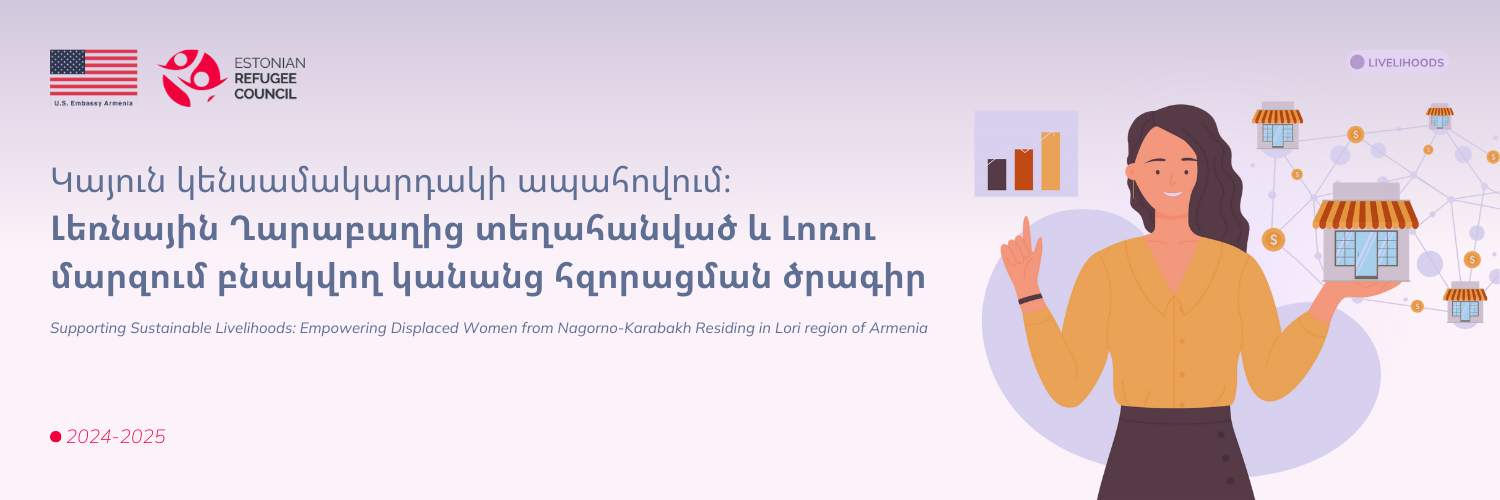Supporting sustainable livelihoods: Empowering displaced women from Nagorno-Karabakh residing in Lori region of Armenia
Application deadline | 25 November 2024 |
Evaluation of applications | 25-30 November 2024 |
Series of entrepreneurship trainings | January 2025 |
Final selection of beneficiaries | February 2025 |
Sub-award disbursement | March 2025 |
Following the events that took place in Nagorno-Karabakh in September 2023, approximately 115,000 forcibly displaced people have relocated to various regions of Armenia. 52 percent of those displaced are women and girls, and are facing numerous settlement challenges. In order to provide a sustainable solution to the social and livelihood issues of displaced women, the Armenian branch of the Estonian Refugee Council (ERC) proposes a project addressing the fundamental challenge of income generation through self-employment. This is essential for the integration of displaced women into new communities and ensuring their economic independence, well-being, and social inclusion.
Eligibility and application process
Who can apply:
Refugee women from Nagorno-Karabakh currently residing in the Lori region of Armenia are eligible to apply. The pre-approval decision will be based on the information provided by the applicant, representing their household, and demonstrating motivation and willingness to engage in entrepreneurial activity.
Prioritized vulnerable groups:
- Single female-headed households
- Woman applicants as the sole breadwinners in their households
- Households with three or more children
- Households including people with disabilities
Key Selection Criteria for Entrepreneurial Sub-award:
- A realistic and feasible entrepreneurship activity plan
- Strong motivation and commitment to sustaining the activity
What the sub-award can be used for?
We do not have strict limitations on the types of entrepreneurial activities supported. The sub-award is intended to help you start or resume income-generating activities, which may include but are not limited to:
- Small-Scale Manufacturing: Producing handmade goods, clothing, or crafts
- Retail Operations: Setting up small shops or kiosks to sell various products
- Agriculture: Purchasing seeds, livestock, or farming equipment
- Services: Offering repair services, beauty treatments, or other personal services
- Food Production: Starting a bakery, café, or small food processing business
Note: Applications that propose only to enhance existing operations or request funding solely for covering learning costs are not eligible under this programme.
How the programme works?
Applicants must submit their applications through the Estonian Refugee Council's online platform. After completing the form, our specialists will review the information provided and, if necessary, request additional details via the email specified in the online form.
The deadline for submitting applications is November 25, 2024. Selected beneficiaries will be notified at the beginning of December.
Selected 30 candidates will participate in a series of entrepreneurship trainings during the incubation period, after which they will develop more detailed entrepreneurial ideas/plans. 15 selected beneficiaries, based on the feasibility and viability of their entrepreneurship ideas, will receive a sub-award of 1,500 USD. This amount will be transferred to their bank accounts for the purchase of necessary goods and equipment, based on sub-award agreements between the ERC and the beneficiary.
Recipients must provide the required documentation for their sub-award expenses, ensuring the funds are used for the intended purpose.
Additional information
If you encounter any issues accessing the application, please contact us at +374 98115109 or at erc.am@pagulasabi.ee.
The decision to apply for the programme is voluntary, and all information provided is confidential. The information shared during the application process will only be used for assessment purposes․
For complaints, feedback, or technical support, please contact us at erc.am@pagulasabi.ee
All humanitarian assistance is free!
This programme is funded by the U.S. Embassy in Armenia
This programme is funded through a Department of State Public Diplomacy Section grant, and the opinions, findings and conclusions or recommendations expressed herein are those of the Author(s) and do not necessarily reflect those of the Department of State.


